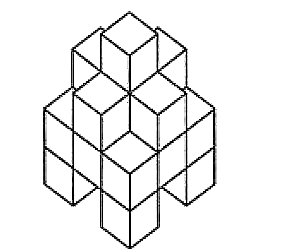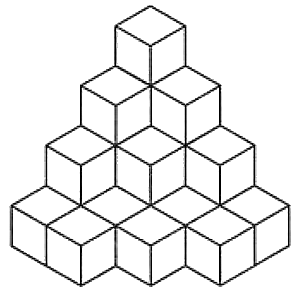BS Sijwali and Indu Sijwali Solutions for Chapter: Cubes, Exercise 3: Master Exercise
BS Sijwali Reasoning Solutions for Exercise - BS Sijwali and Indu Sijwali Solutions for Chapter: Cubes, Exercise 3: Master Exercise
Attempt the practice questions on Chapter 7: Cubes, Exercise 3: Master Exercise with hints and solutions to strengthen your understanding. Non Verbal Reasoning for Management, Banking and UPSC etc. solutions are prepared by Experienced Embibe Experts.
Questions from BS Sijwali and Indu Sijwali Solutions for Chapter: Cubes, Exercise 3: Master Exercise with Hints & Solutions
small cubes of same size are arranged in two cubes of sides and each. The bigger cube is coloured red on two opposite faces, white on two adjacent faces and blue on the remaining faces while the smaller one is coloured white on two opposite faces, blue on two adjacent faces and red on the remaining faces. Taking both the cubes into consideration, answer the following questions based on the above information.
Leaving out uncoloured cubes, how many cubes are there without any red face?
small cubes of same size are arranged in two cubes of sides and each. The bigger cube is coloured red on two opposite faces, white on two adjacent faces and blue on the remaining faces while the smaller one is coloured white on two opposite faces, blue on two adjacent faces and red on the remaining faces. Taking both the cubes into consideration, answer the following questions based on the above information.
How many cubes have at least one red face?
small cubes of same size are arranged in two cubes of sides and each. The bigger cube is coloured red on two opposite faces, white on two adjacent faces and blue on the remaining faces while the smaller one is coloured white on two opposite faces, blue on two adjacent faces and red on the remaining faces. Taking both the cubes into consideration, answer the following questions based on the above information.
How many cubes have at least one white face?
small cubes of same size are arranged in two cubes of sides and each. The bigger cube is coloured red on two opposite faces, white on two adjacent faces and blue on the remaining faces while the smaller one is coloured white on two opposite faces, blue on two adjacent faces and red on the remaining faces. Taking both the cubes into consideration, answer the following questions based on the above information.
How many cubes are coloured on two faces only?
A cube has six faces each of a different colour. The red face is opposite to black. The green face is in between red and black. The blue face is adjacent to white and brown face is adjacent to blue. The four colours adjacent to green are :
If the stack of blocks pictured here looks the same from all four directions, what is the maximum number of blocks that could be used to build it, based on what you can see from this angle?

A cube is formed by gluing together wooden blocks that are . If the cube is resting on a table, what is the maximum number of blocks that you can see from any angle at any one time? (If you can see even one face of a block, then count it.)
What is the fewest number of blocks you need to add to make this shape into a cube?

